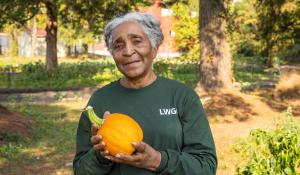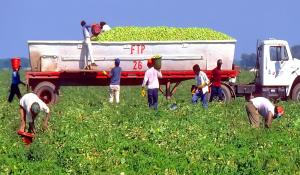
As the last of the snow thaws in western Michigan, cherry trees herald the return of spring with a bold display of pink and white blossoms. Some see this spectacle as a unique photo opportunity, but Gabrielle Cerberville sees a seasonal vegan treat.
Cerberville is a graduate student at Western Michigan University on the weekdays and a forager on the weekends. Foraging is the process of finding, identifying, and collecting edible flora and other food resources in the wild. It requires a proficiency in recognizing plant species to determine what discoveries are suitable to eat and what are inedible.
Foraging Together While Apart
Cerberville is one of several foragers that have grown a community on TikTok, where she shares quick videos about hunting morels, brewing lemonade from sumac berries, and making ramp salt. In one of her videos, she picks a handful of petals from pink cherry blossoms and turns them into a traditional Japanese candy called kohakuto, taking viewers with her from harvesting, to cooking, and eating.
Cerberville started the account under the username @chaoticforager in the spring of 2020 and has since grown a following of 270 thousand and growing. Initially, the account acted as a fun video journal, but soon followers started asking about how to find wild food themselves.
@chaoticforager Cherry blossom kohakutou! @thecoldestwater #thecoldestwater #foraging #foragingtiktok #ad #learnontiktok #veganrecipes #vegancandy #wildfood #flowers
♬ Rivendell - Howard Shore
“I think foraging connects you to a place and time in a way that few other things do,” says Cerberville. “I wanted other people to experience the joy of walking outside and being surrounded by familiar plant and fungal friends. I also think that the foraging community often looks very white and very male, and as a queer Latina woman I wanted to show more representation.”
At the start of the coronavirus pandemic, the UN Food and Agriculture Organization warned that protectionist measures by national governments could lead to food shortages worldwide. While many people turned to gardening to supplement their food supply and keep busy during the first rounds of lockdown, some turned to wild food. In a July 2020 Civil Eats survey, ten foraging educators and advocates observed between a 25 percent and 500 percent increase in traffic to their websites and classes.
The newfound excitement for foraging is a reason for celebration as more people reconnect with their natural environment. And as more people venture outdoors, harvesting sustainably must be emphasized to avoid overextraction.
Connecting with the Earth
Linda Black Elk is a lifelong forager and teaches foraging and other lessons in food as the food sovereignty coordinator at the United Tribes Technical College in Bismarck, North Dakota. Her experience is informed by learnings from her grandmother, a descendant of several Indigenous tribes in the eastern US, her mother, whose central and east Asian perspectives have taught her about plants as medicine, and her husband and children from the Cheyenne River Reservation and the Standing Rock Reservation. Harvesting sustainably is important to Black Elk because Indigenous peoples have a deep and storied relationship with the land.
“It’s not just a fun hobby to us. This is literally our life,” says Black Elk. “This is the stuff that sustains us and has sustained our ancestors. We look at this stuff as the food that feeds us spiritually as well as physically. So, if people are going to go out there, all we ask is that they do it in a respectful way.”
Black Elk says that before anyone gets started in foraging, they should build a relationship with the natural world. She uses stinging nettles as an analogy for maintaining friendships with other people.
“You have to harvest them in a way that is respectful, otherwise they’re going to sting you pretty badly,” she says. “Once you start thinking of plants as your relatives, as your friends and your allies, you really gain a new respect for them, and it just wouldn’t occur to you to overharvest.”
Black Elk recommends learning only five plants at first and learning them well enough to identify by season. Otherwise, newbie foragers can overwhelm themselves and make mistakes that could hurt themselves and the plants.
Yet, foraging is more than just finding delicious things to eat. Casual foragers can learn the survival skills to handle persistent issues like food insecurity in the US. Cerberville started foraging more often during college when money was tight and the Black Elk family gets up to 40 to 50 percent of their food from wild sources, gardening and by trading with others.
Black Elk is most excited for potential foragers to build a stronger relationship with the natural world. Understanding the interconnectedness of plants, animals, and humans is a large part of the practice.
“My grandmother said to me once that you’re not home if you don’t know the plants,” says Black Elk. “Getting to know them and really feeling at home, feeling connected to a place, is really important.”
How To Forage Sustainably
Abundance does not equal sustainability. Just because there is a lot of something, does not mean it should be gathered. It is best to pick a little so that the plant can repopulate next year. A rule of thumb is to harvest no more than 25 percent, but it is often better to do much less—as more foragers and animals eat from the same plant, the less likely it is for the plant to come back next year.
Know what dish you are preparing before foraging. Having this information beforehand will prevent accidental overharvesting or gathering the wrong parts of the plant.
Collaborate with foraging friends. Sharing and trading with others reduces waste and the likelihood of overharvesting from the same foraging spots.
Study which invasive plants are edible. Invasive plants can be picked in abundance because they have no trouble repopulating and often choke out native plant species.
Study the plants you intend to forage—understand how they repopulate, the purpose of each part of the plant in its lifecycle and in your recipes, and its natural history. The deeper your knowledge, the less likely you will be to gather more than you intended.







